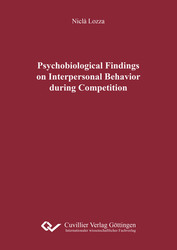| Fachbereiche | |
|---|---|
| Buchreihen (97) |
1381
|
| Nachhaltigkeit |
3
|
| Gesundheitswesen |
1
|
| Geisteswissenschaften |
2371
|
| Medienwissenschaften | 16 |
| Theologie | 57 |
| Philosophie | 102 |
| Rechtswissenschaft | 423 |
| Wirtschaftswissenschaften | 853 |
| Sozialwissenschaften | 417 |
| Sportwissenschaften | 48 |
| Psychologie | 233 |
| Pädagogik | 190 |
| Geschichtswissenschaften | 183 |
| Kunstwissenschaften | 111 |
| Kulturwissenschaften | 166 |
| Literaturwissenschaften | 117 |
| Sprachwissenschaften | 88 |
| Naturwissenschaften |
5408
|
| Ingenieurwissenschaften |
1798
|
| Allgemein |
98
|
|
Leitlinien Unfallchirurgie
5. Auflage bestellen |
|
Erweiterte Suche
Psychobiological Findings on Interpersonal Behavior during Competition
Niclà Lozza (Autor)Vorschau
Leseprobe, PDF (320 KB)
Inhaltsverzeichnis, PDF (100 KB)
In view of the importance of interpersonal processes for humans as social beings, the question of how individuals coordinate their verbal and nonverbal behaviors and what influences their interpersonal style is of high relevance. However, research on interpersonal behavior during competition has produced mixed findings. The present thesis aims to contribute to the explanation of interpersonal behavior during competition. Two empirical studies were conducted to investigate how interpersonal coordination is associated with competition outcomes as well as the hormonal predictors of interpersonal behavior during competition.
In our first study, we examined the associations between interpersonal synchrony and various competition outcomes. In our second study, we investigated the joint effects of acute psychosocial stress, testosterone, estradiol and cortisol on interpersonal behavior during competition.
| ISBN-13 (Printausgabe) | 9783736993600 |
| ISBN-13 (E-Book) | 9783736983601 |
| Buchendformat | A5 |
| Sprache | Englisch |
| Seitenanzahl | 130 |
| Umschlagkaschierung | matt |
| Auflage | 1. Aufl. |
| Erscheinungsort | Göttingen |
| Promotionsort | Zürich |
| Erscheinungsdatum | 04.10.2016 |
| Allgemeine Einordnung | Dissertation |
| Fachbereiche |
Psychologie
|
| Schlagwörter | competition, interpersonal theory, embodiment, synchrony, nonverbal, complementarity, acute stress, cortisol, gonadal steroid hormones |








